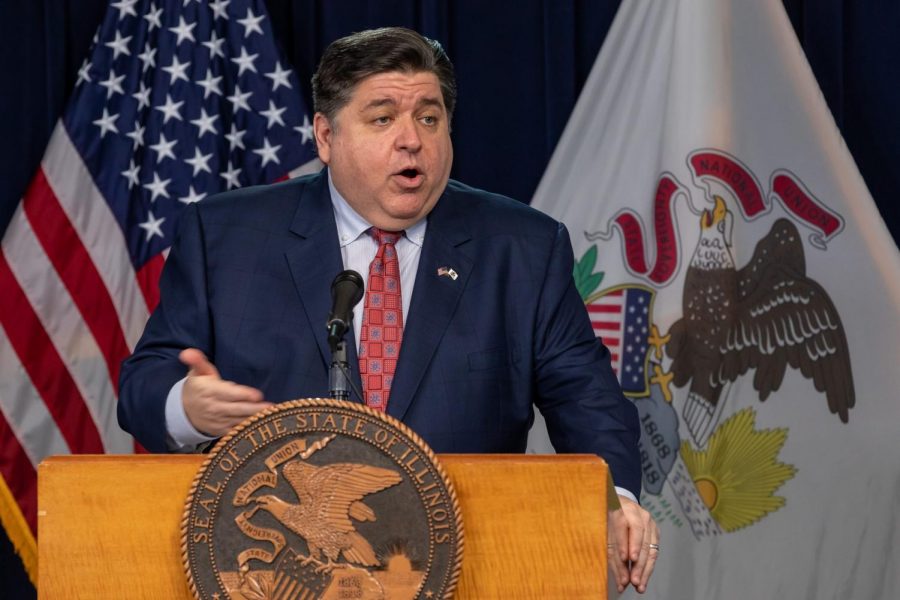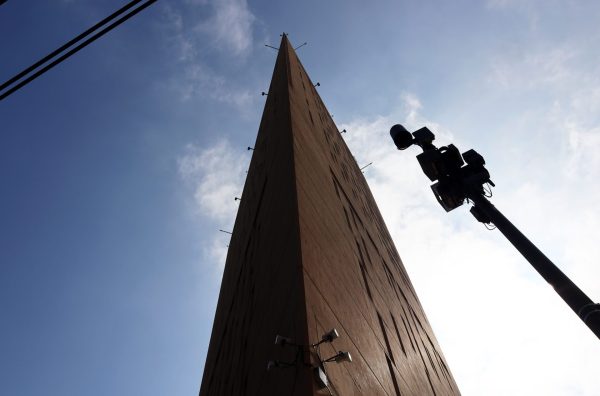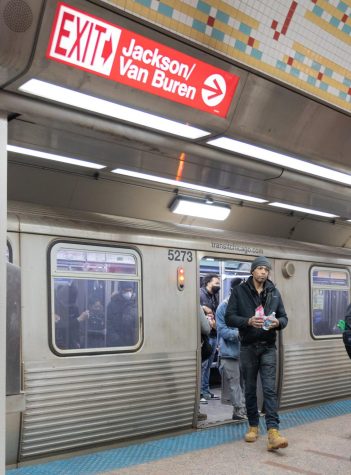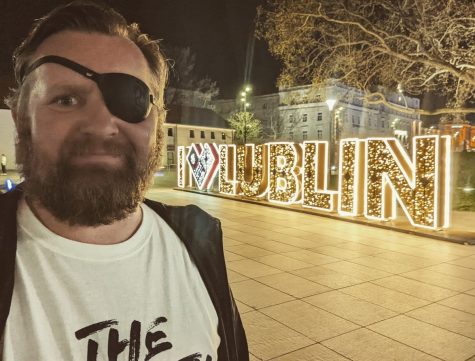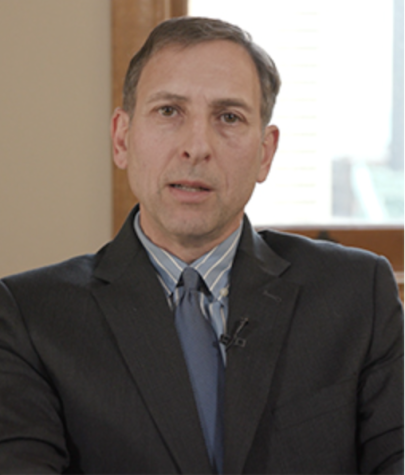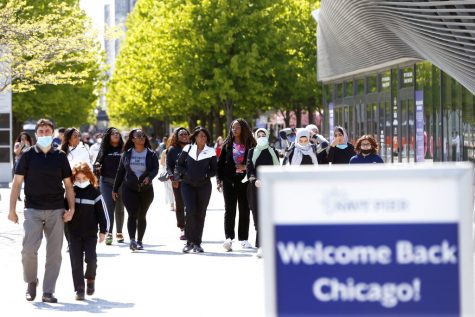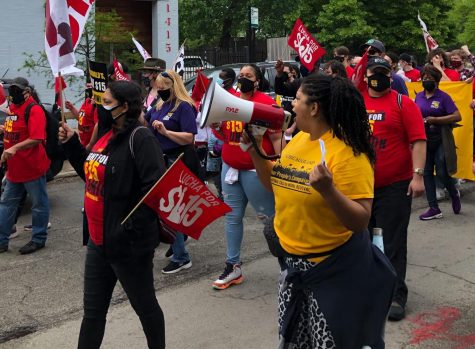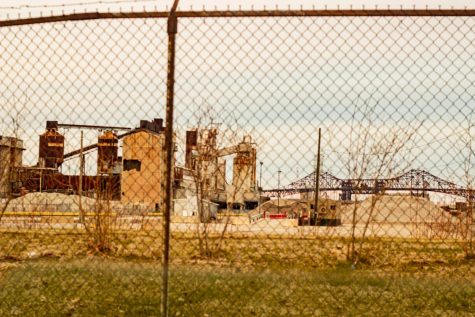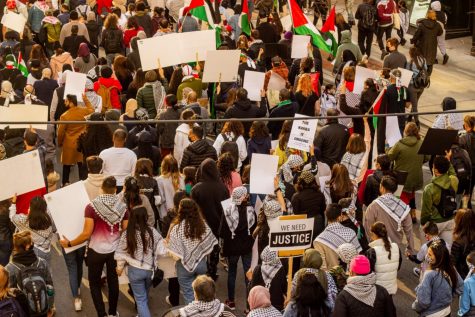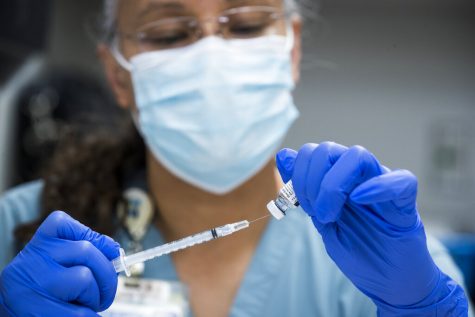Pritzker: College students ‘further back in line’ for Covid-19 vaccine
DePaul University/Jeff Carrion)
llinois Governor JB Pritzker talks to journalism students, Thursday, Feb. 4, 2021, in the press room of the Thompson Center in downtown Chicago. Journalism students and faculty attended the candid discussion about the governor’s career and Illinois politics, followed by a question and answer session from the university’s student media outlets.
Governor J.B. Pritzker said at a DePaul student media press conference that college students will have to wait a while longer before receiving the Covid-19 vaccine.
The governor held the conference as part of an event held by the DePaul Center for Journalism Integrity and Excellence.
When asked how his office would plan to ensure vaccinations for the state’s college students before the next academic year, Pritzker said that college students without pre-existing health conditions will be “further back in line.”
“My job – and there’s no doubt about it during this pandemic, at this moment – is to take as many of the vaccine doses that we receive for the state of Illinois, and get them into people’s arms as quickly as we can,” Pritzker said. “…The best answer I can give is we’re working as fast as we possibly can to ramp up…administering the vaccines.”
DePaul president A. Gabriel Esteban announced earlier this week that the university plans for a “full complement of in-person classes” fall quarter, following a phased return for faculty in the summer. It is unclear whether DePaul will require students, staff and faculty to be vaccinated to return to campus or how they will verify that information.
DePaul announced previously it will send out a survey to staff, faculty and student employees in the coming weeks to gauge their interest in and ability to receive the Covid-19 vaccine.
But other than the survey, DePaul has no extensive vaccination plan at this time and is considerably behind when compared to other colleges in the Chicago area.
Columbia College Chicago announced in an email to faculty and staff back in January, that it will offer free vaccinations to those who are eligible and outlined the phases in which people can receive them. The email provided that the college will receive doses of the vaccine from the city of Chicago and [or] the state of Illinois.
The University of Illinois at Chicago announced Jan. 15 that it will be charging insurance plans for delivery and is “committed to offering Covid-19 vaccines to the campus community as quickly and safely as possible to help control community spread.”
The University of Chicago announced in an internal email obtained by The DePaulia that its goal is to “facilitate vaccine access for all eligible members of the university community, beginning Jan. 31 free of charge. In a Jan. 4 announcement from the University of Chicago’s Office of the Provost, the university said it is“committed to expending every effort to ensure that our faculty, students, staff and members of our broader community have access to the vaccine as soon as possible.”
During a faculty council Q&A session back in early January, President A. Gabriel Esteban spoke to faculty regarding the university’s vaccination plans.
When asked by a Faculty Council member about the vaccination process for faculty, Esteban responded that it is “not such a big issue.” He also said he was mainly concerned about the vaccination process for students.
“Right now, there is no plan on forcing people to have vaccinations,” Esteban said.
Another hurdle facing the vaccination process regards distrust in communities of color. This is of particular importance given that in many cases, communities of color are singled out as the most affected by the virus.
Pritzker argued that it is a goal to create a conversation with communities of color.
“Many [people of color] are hesitant because they don’t know anybody who’s been vaccinated,” Pritzker said. “They want a friend or a relative or somebody that they know, to get vaccinated, maybe even get the second dose, and then they can ask them, ‘How did that go? How do you feel? What’s this gonna be like?’ We’re all a little like that, I think.”
The first step is to connect with communities of color and public health officials. Pritzker referenced Dr. Ngozi Ezike as a powerful example of lessening mistrust in communities of color surrounding the vaccine.
“I think there’s a little bit of suspicion, a little bit of concern, and we just have to get past the concern and the suspicion partly by saying, hey, people in power like Dr. Ezike are willing to get vaccinated,” he said. “She knows as much as anybody knows about these vaccines. And she stood up and did it and she feels fine. And hopefully by example that helps people get past.”
As of Feb. 4, the state of Illinois has administered 1,156,453 vaccines and 256,839 people have been fully vaccinated with both doses. Since transitioning into phase 1B on Jan. 25, the percent of the population fully vaccinated has increased from 1.69 percent now to 2.02 percent.
“I want everybody to get vaccinated as fast as possible,” Pritzker said.


